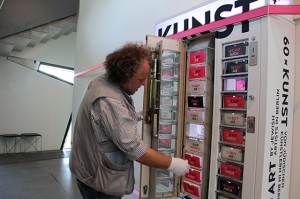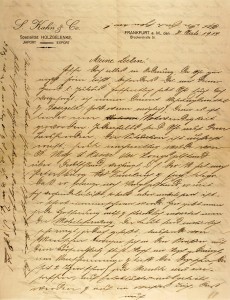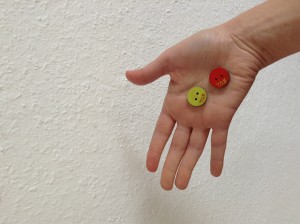Handmade, for our Art Vending Machine

Jens Eisenberg (company Leitwerk) fills our art vending machine.
© Jewish Museum Berlin, photo: Gelia Eisert
Anyone who walks through the first floor of our permanent exhibition has inevitably stumbled across our ‘art vending machine.’ The machine almost seems to be whispering, in two languages, “Kauf mich, buy me.” Labels gleam colorfully from the compartments but you won’t notice more than that at first. If you get curious, though, and come closer, you will read the inscription, “Kunst / Art” in big typeface, and along the vending machine’s side, “60 x art by Jewish artists in Berlin.” Now you notice the coin slots, where you can put in your 4 euros.
With the right change in your pocket and a little audacity, you can start the experiment. → continue reading
A Letter from the Archive Tells of the Outbreak of War in 1914

Letter from Leo Roos to his family (first page), Frankfurt am Main, 31 July1914
Donated by Walter Roos
© Jewish Museum Berlin
“The situation is extremely serious; His Majesty the Emperor declared this afternoon that Germany is now at war.” Exactly one hundred years ago today, eighteen-year-old Leo Roos penned these lines to his parents and siblings back home in the West Palatine village of Brücken. But they were never to receive his letter, as the note on the envelope attests: Dispatch prohibited on account of the state of war. Return to sender.
Roos felt he was witnessing fateful times. He lived in Frankfurt, where he was apprenticed to a bank. He thought himself a city boy, much closer to momentous global events than his family was, off in its isolated village. He described the tense mood: → continue reading
An Interview with Lina Khesina
30 July 2014 is International Friendship Day. But how do we commemorate friendship? Or how do we make it visible? We consulted with communications designer Lina Khesina to find out. She devised a pair of ‘friendship buttons’ that you can get at the moment from the art vending machine in our permanent exhibition. One of them features the word “Tsemed” in Hebrew script, and the other one the word “Chemed.”

The buttons “Tsemed” and “Chemed”.
Photo courtesy of the artist
Lisa Albrecht: Lina, why did you develop this item in particular for the art vending machine?
I had the idea of showing the beauty of the Hebrew language and transmitting it in an everyday way. I don’t actually speak Hebrew myself, but purely from a musical perspective I find it and Spanish the two most beautiful languages. So I really wanted to discover Hebrew for myself and find a constellation of words in the language that I could play with. That’s how these buttons with the wordplay emerged.
How did the wordplay occur to you?
In Russian, best friends are often called “nje rasléj wodá”, which more or less means “even water cannot destroy this bond.” I did some research on whether there’s such an idiom in Hebrew as well and thus learned about “Tsemed Chemed.” Translated literally, it means “sweet entanglement” or “fine pair”, and is an expression for ‘close friends.’
What do these two words have to do with the buttons?
Buttons get sewed on with a thread and become then ‘entangled,’ or interwoven, with the material. Close friends experience something similar, even when they live thousands of kilometers apart. Like the buttons, they’re connected to each other by the thread and the adage. → continue reading


